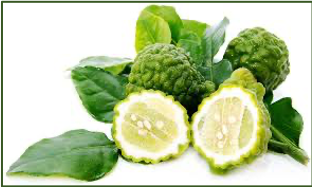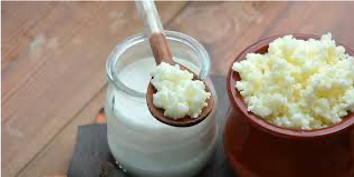From our resident Food Finder Krissy Billiczky
Today’s herb / plant is Kaffir Lime leaves
 Kaffir or Makrut limes (Citrus hystrix) are different from regular limes in that they are very bitter with bumpy skin. In Thailand, the makrut limes are not consumed but are used mainly in producing household cleaning products.
Kaffir or Makrut limes (Citrus hystrix) are different from regular limes in that they are very bitter with bumpy skin. In Thailand, the makrut limes are not consumed but are used mainly in producing household cleaning products.
The leaves, however, are very aromatic and can be eaten if very thinly sliced or cooked.
Makrut lime leaves are the Asian equivalent to bay leaves. They can be added whole to Thai curries, soups, and stir-fries and can also be cut up into very thin slivers and added to spice pastes or used as a topping in a variety of recipes.
Scientific research is limited but it is suggested that kaffir lime leaves has the following benefits:
- can help with stress release due to the fragrant essential oils in kaffir limes which in aromatherapy are used to reduce stress, anxiety and fatigue
- can help good oral health – before the invention of toothpaste, the people in South Asia chewed kaffir lime leaves for oral hygiene due to its natural antibacterial properties and nice fragrance in the oil
- may have antiseptic properties so will prevent growth of bacteria and help would healing
- can contribute to good skin health – due to the anti-oxidant qualities of terpenes of kaffir lime oils such as citronellal and limonene
- can help keep bugs and mosquitoes away because of its citronella oil content
Kaffir lime leaves are sold fresh, frozen, and dried and generally safe to us for most people.
Due to its caffeine content, pregnant ladies should reduce or avoid.
If in doubt, s ever, please seek advice from a healthcare or medical professional.
Today’s second K is Kefir
….so deviating from spices and herbs (not many with K)
 Kefir is a cultured, fermented beverage that tastes a great deal like a yogurt drink. It’s made using “starter” grains. This starter is a combination of yeasts, milk proteins, and bacteria. It has a tart, creamy flavour, and it’s loaded with probiotic health benefits.
Kefir is a cultured, fermented beverage that tastes a great deal like a yogurt drink. It’s made using “starter” grains. This starter is a combination of yeasts, milk proteins, and bacteria. It has a tart, creamy flavour, and it’s loaded with probiotic health benefits.
Kefir is most commonly made with dairy milk, but it can be made with non-dairy alternatives including coconut milk and rice milk.
Because kefir is fermented, most people who are lactose intolerant can actually drink kefir.
Kefir is nutrient-dense, with plenty of protein, B vitamins, potassium, and calcium.
Calcium helps to build strong bones, protein builds strong muscles, and potassium is essential for heart health.
The probiotics are the strongest health benefit that kefir has to offer, probiotics help:
- improve the healthy bacteria ratio in the gastrointestinal tract’s environment
- treat or prevent diarrhoea, especially following antibiotic treatment
- treat irritable bowel syndrome, or relieve symptoms
- reduce or prevent gastrointestinal infections, or increase recovery from them
- prevent and treat vaginal infections
- prevent and treat urinary tract infections
But due to its high Calcium levels, kefir helps improve bone health and reduce risk of osteoporosis.
Kefir is same to consume for most people and it is widely available to purchase plain and flavoured options in most supermarkets.
If in doubt, as ever, please seek advice from a healthcare or medical professional.
